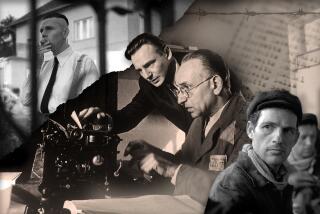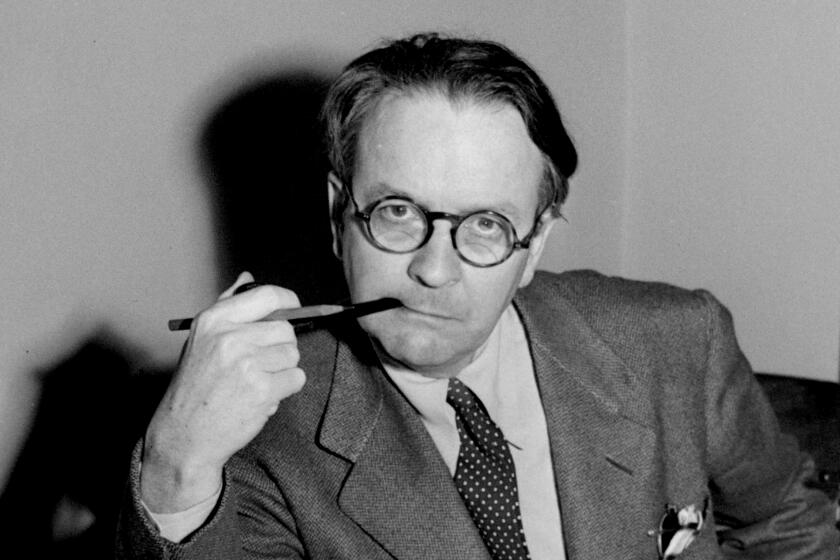The Writing Life: Art Spiegelman explores living in the shadow of ‘Maus’
- Share via
Art Spiegelman has been here before. At 63, dressed in black jeans, a denim shirt and that ubiquitous vest, he is talking, again, about his graphic memoir “Maus,” the saga of his father Vladek’s experiences during the Holocaust and of Spiegelman’s efforts to get to know that father — to inhabit his story, if you will.
“Maus” was originally published in two parts, the first in 1986 and the second in 1991; it won a special Pulitzer Prize in 1992, the first comic to be so honored. Still, for the last two decades, Spiegelman has kept doubling back, reconsidering the project, drawing its mouse-like protagonist into nearly everything.
“I’m blessed and cursed by this thing I made that obviously looms large for me and for others,” he observes on a sunny October morning in Beverly Hills, eyes blinking behind wire-frame glasses as he smokes on the balcony of his room in the Four Seasons Hotel. “But the result is that I can’t do this thing that seems quite easy but that I just can’t do, which is: ‘That’s that, and now I’m working on a new thing, and it’s a whole other thing.’ I just can’t get out of its gravitational field.”
Spiegelman’s latest book is a case in point: “MetaMaus” (Pantheon: 302 pp., $35), a lavish deconstruction of his magnum opus, positioned as a 25th-anniversary commemoration, although that’s just a convenient peg. More apropos is his sense of reckoning with the legacy of “Maus.” “For the most part,” Spiegelman says, “I’ve been trying to outrun it, and it hasn’t worked very well. So this seemed like: OK, if you can’t outrun it, just stare the damned beast down.”
At the heart of the project are three long conversations he pieced together with Hillary Chute, a former graduate student who teaches at the University of Chicago. (“Everything takes me so long,” Spiegelman laments.) Built around the central questions of his post-”Maus” existence — Why the Holocaust? Why mice? Why comics? — “MetaMaus” can be read as a last interview, an attempt to answer all the questions and render further discussion moot.
“I didn’t predict this for myself,” Spiegelman admits, firing up another cigarette. “I thought ‘Maus’ was going to take two years and I’d move on with my life. But it’s an ongoing wrestling match. Basically ‘Breakdowns’ ” — the 2008 collection that recontextualized his early work, including the first three-page “Maus” strip, from 1972 — “and ‘MetaMaus’ are the great retrospections, the period of my life I’m still swimming out of. Then I get to find out if there’s any other stuff in my pockets to make bets with.”
And yet that notion of a summarizing conversation, Spiegelman notes, is a false one, for if “Maus” has anything to tell us, it’s that closure is a sentimental trope. How do we find closure for an event so tragic that even the idea of tragedy cannot do it justice, from a loss so epic it’s impossible to understand as loss? This is what “Maus” stands against, the conceit that suffering is ennobling, that we learn from it and are enlarged. “MetaMaus” makes the point explicit by taking us inside the process, opening up an archival wormhole, full of drafts, sketches and antecedents.
The book features hundreds of images, by Spiegelman and others; there are charts, page breakdowns, fascinating discussions of structure — but even more, the sense that the work itself was anything but inevitable, that it was an epic struggle to produce. In a section called “Family Album,” Spiegelman’s wife, New Yorker art editor Françoise Mouly, describes his state during the 13 years, from 1978 to 1991, that he worked on “Maus”: “Whenever he stalled or despaired,” she recalls, “which was erratic throughout, but inevitable every time he finished a chapter, it was painful to see him deeply depressed, and just as tough when he dove back into it.”
This grew only more heightened once the first part of “Maus” came out and Spiegelman had to complete the work. “Maus I” ends at the gates of Auschwitz — its own kind of dead end, since, he explains, “it was impossible for me to imagine life in the death camps.” Besides his father’s memories, there were few useful sources; one was Tadeusz Borowski’s “This Way for the Gas, Ladies and Gentlemen,” a 1959 story collection Spiegelman admired for its “chilled, camera-like eye, as if Raymond Chandler was not the sentimentalist he is but had been in Auschwitz.”
And there was guilt, shattering guilt, especially as “Maus” became totemic — a conflict Spiegelman weaved into the narrative. “I felt guilty,” he says, “about the success of ‘Maus’ because it was built on so much murder.”
That, of course, is the genius of “Maus,” the way Spiegelman works in all these layers, evoking the Holocaust and its aftermath in his life. Key to this, “MetaMaus” makes clear, was his relationship with Paul Pavel, the therapist who was also a camp survivor and with whom Spiegelman rethought not just guilt or creative issues but, indeed his entire worldview. In “MetaMaus,” he recalls Pavel — who counseled dying AIDS patients — declaring himself a nihilist, a claim Spiegelman found hard to accept. Pavel’s response? “Well, I decided that behaving ethically was the most nihilistic thing I could do.”
All these years later, Spiegelman still seems transformed by the sentiment, which offered if not meaning then a sense of purpose in a universe that is indifferent when it’s not malevolent. “It was an important perspective,” he says, “for me to deal with the horrors of the history that I was singed by and not have the takeaway be: Well, you might as well become an ax murderer, because why not? There are very few ways out of that conundrum. God has a plan even if I don’t understand it? That one didn’t work for me. Or: We must be ethical creatures. Why? It’s not an ethical place.”
Such questions remain central to “Maus” and “MetaMaus,” which function in a sense as bookends or the opposing lenses of a telescope. The relationship defines the new book, which comes with a DVD featuring a digital version of the original, enhanced by audio recordings of Spiegelman’s father, research footage from a 1987 trip to Auschwitz, notebooks, studies, documents. There is also a 25th-anniversary edition of “The Complete Maus,” which, Spiegelman notes, is “conformed to ‘MetaMaus,’ with the same spine, same binding, so there’s ‘The Complete Maus’ and then a book the same size, almost exactly the same number of pages, and the two can leak into each other if one wants to go that way.”
Yet most important, perhaps, is another form of leakage — that between Spiegelman, who was in his late 50s when he began the interviews that became “MetaMaus,” and his father, who was only a few years older when his son began to ask him about the Holocaust. “I don’t want to get lost,” Spiegelman says, “in the labyrinth of: First, he did this book that was an interview with his father, and then he did this book that was about the interview with his father. But there is this thing of coming to terms with him. I became a father myself after he died, and the problems, the differences and similarities, my ability to understand his mind-set in a different way, definitely informs this revisiting.”
More to Read
Sign up for our Book Club newsletter
Get the latest news, events and more from the Los Angeles Times Book Club, and help us get L.A. reading and talking.
You may occasionally receive promotional content from the Los Angeles Times.










